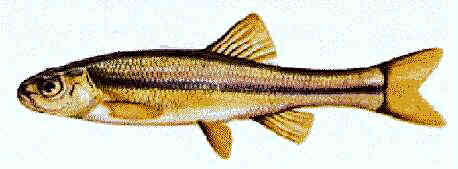The fathead minnow is a stubby, heavy-bodies fish with a small mouth and incomplete lateral line. It’s color is olive to gray above which shades to straw color or white on the belly. Adult fathead minnows generally average 2-3 inches in length. They seldom exceed 3 inches.
The fathead minnow occurs in all watersheds throughout New York, except Long Island. It is a popular bait fish and its distribution has undoubtedly increased due to releases by anglers. The fathead’s preferred habitat consists of ponds and slower streams, although it will tolerate a wide range of conditions. The diet of the fathead minnow includes algae, bottom detritus, and zooplankton.
Fathead minnows spawn from late May to August when water temperatures are in the 65 F to 80 F range. They are very prolific and will spawn several times over the summer. Males set up territories and prepare the nest by sweeping out a cavity such as the underside of rocks, wood, or other debris. The eggs are deposited on the underside of these objects by the female. Fatheads have been found to nest under discarded lumber, PVC pipe, and even empty beverage cans. The males develop thick fatty pads behind the top of the head and large tubercles across the snout during breeding season. Sometimes small tubercles also occur on the top of the head. Breeding males become very dark and also exhibit dark bands or rings around the body.
Fathead minnows should be
stocked in all ponds where
the stocking of game fish
is anticipated.
They will provide an excellent food source. The minnows should be stocked well in advance of the game fish. This allows the minnows to reproduce and a stable population to become established. We suggest a stocking rate of 10 lbs. or roughly 3,000 fathead minnows per surface acre. Bass, walleye, perch, crappie, etc. will not grow without an adequate supply of natural food.
